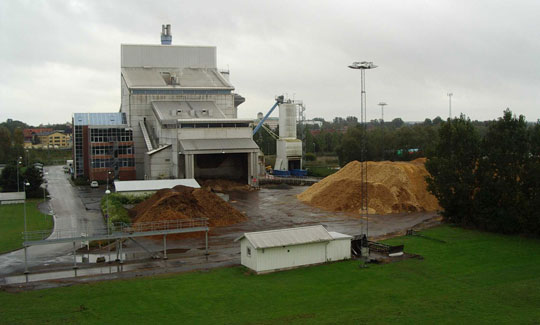The city 'recharges' with organic waste
Based on food waste, organic fertilizer and cooking oil, a city in Sweden has significantly reduced fossil fuel consumption, according to The New York Times.
Kristianstad and the surrounding area, with a population of about 80,000, do not use oil, natural gas or coal to heat homes and businesses, even in long winters.

A "green" house in Kristianstad city. (Internet photo)
This is completely different from 20 years ago, when all heating is based on fossil fuels.
This southern Swedish region, known as the Absolut home of vodka, does not replace traditional fuels but abandons them with solar panels or wind turbines.
Instead, with the main activity of growing food and processing food, this area produces energy from raw materials such as potato peels, organic fertilizer, used cooking oil, rotten biscuits. and pig intestines .
A suburban factory called Kristianstad uses a biological process to turn the said waste into biogas, a methane form. The gas is burned to heat and produce electricity, or recycled into fuel for cars.
The city also burns gas emitted from an old landfill and waste reservoirs, as well as debris from carpentry workshops and trimmed branches.
Kristianstad officials said the city's carbon dioxide emissions have decreased by a quarter in the past decade.
The local government hopes that by 2020, the total emissions will be 40% lower than in 1990, and the operation of the city will not require fossil fuels and will not produce emissions.
In the past 5 years, many European countries have increased the use of renewable energy from wind power stations and hydroelectric dams, because fossil fuels have become expensive and overuse of this fuel. taxed according to the European Union's emissions trading system.
- Compost made from organic waste efficiently used
- Czech Republic tightens the mandatory classification of waste
- Feeding worms
- Producing coal from waste
- Waste into organic fertilizer by microbial preparations
- Collect millions of dollars by turning waste into clean coal
- Treat leachate with ozone
- The reason many people prefer organic food
- Fly species - 'savior' is useful to handle leftover foods
- Production of biofuels thanks to microwaves
- Technology turns human waste into cheap coal
- Scientist 83 years and 20 years pursuing turns garbage into money
 'Barefoot engineer' invents a pipeless pump
'Barefoot engineer' invents a pipeless pump Process of handling dead pigs due to disease
Process of handling dead pigs due to disease Radiometer
Radiometer Warp Engine: Technology brings us closer to the speed of light
Warp Engine: Technology brings us closer to the speed of light